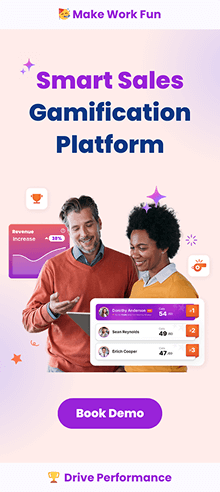n layperson terms, sales enablement might refer to providing a sales rep with everything they need to execute successful performance in the sales department. This description is fair enough, but at this point, many people confuse sales enablement with its sister concept: sales training.
Sales enablement and sales training come under the same umbrella, but they have their own domains and functions. Consequently, the coaching for sales enablement also varies from sales training!
The Difference Between Sales Training and Sales Enablement Coaching
Sales training takes forms the primary benchmark of sales coaching. Sales training refers to imparting attitudinal and behavioral knowledge and know-how to sales professionals to help them perform better in different sales processes. Sales training comprises of skills such as persuasion, honesty, consistency, and techniques in record-keeping and other aspects of the sales job. Training is an essential part of becoming a salesperson.
Conversely, sales enablement coaching is about empowering an already-established sales representative or any other sales professional with a higher degree of sales tips, techniques, tools, resources, and approaches.
Sales enablement essentially helps sales professionals build an entire ecosystem that includes behavioral training required to do better in the sales department. While sales training specifically focuses on the steps one needs to take to become a salesperson or a sales professional, sales enablement coaching deals with the toolkits and environment in which a sales professional’s skills can further flourish.
What are the Most Common Features in Sales Enablement Coaching?
1. Outreach Templates
One of the most basic, simple, and yet highly effective tools in sales enablement coaching are outreach and response templates. While regular sales practice concerns itself with only making a successful sale, a sales enablement coach is also responsible for equipping sales professionals with the correct types of templates for outreach and response.
In addition, once a sales professional makes a sale, a sale enabler aims to provide the professional with templates that can help monitor the sold product’s performance and customer satisfaction.
These templates are usually for emails, website chatbots, text messages, and sometimes for phone dialers. Equipping sales teams with personalized and customizable outreach templates enables sales professionals to gather an in-depth understanding of their product and their performance in selling the product.
2. Sales Gamification
This is another enablement phenomenon that forms the basis of many secondary sales enablement tools. It uses a gamified simulation or environment to empower and encourage sales professionals to move forward in their careers while improving their service quality in a friendly, constructive manner. Unfortunately, the sales gamification technique does little to directly engage with clients and customers.
Still, a well-implemented sales gamification can help a company bolster its sales performance and customer satisfaction stats by several notches!
Sales gamification refers to the fusion of gameplay and professional tasks to encourage friendly competition through scoreboards, rewards, rankings, and other game elements. As a result, the sales personnel compete to win by improving their sales performance. In all, gamification in sales provides sales professionals with an environmental enabler and satisfies the clients and customers with improved performances.
3. Product Demos
There are only a few things worse than having a struggling sales representative in the market. One of them is to have a struggling representative present one of your most anticipated products with zero homework!
When it comes to sales enablement coaching, a large part of the practice is enabling sales personnel to sell a product. You indeed have designed a product that’s bound to walk off the shelves, but you also need a competent sales representative to make that sale happen. The catch here is to enable the salesperson to perform successful demonstrations even when they don’t know much about the product, and that’s where product demos come in.
Product demos are a technique in sales enablement where the salesperson practices their selling skills using a demo product. The enabler works on the salesperson’s appearance, knowledgeability, speech, stance, confidence, and other elements that a customer is most likely to notice while viewing the product and the demonstration itself. The coaching of product demos is pretty similar to a stage rehearsal; it enables the salesperson to prepare themselves in the most generic way possible to earn sales incentives later on.
4. Client and Customer Testimonials
Getting to know what your clients and customers think of your sales expertise can be a pretty helpful feat in sales enablement. Instead of simple satisfaction analytics that is based on generic, rating-based feedback, customer testimonials go much deeper in identifying patterns of sales techniques that have been useful or useless in implementing that sale.
Testimonials are inherently organic and, for the most part, unfiltered by the company. Therefore, they provide valuable tools in sales enablement coaching by helping sales professionals understand the implications of their sales strategy. This enablement coaching works in three different ways. The first stage involves enabling sales professionals to interpret the testimonials they receive.
The second step involves coaching the sales personnel in critical thinking of their sales strategy and actions. In the third step, sales enablement coaching increases the chances of using testimonials to work on one’s sales techniques in light of new opinions by customers and clients. In this sense, sales enablement coaching empowers sales personnel to adapt to changed practices and policies in the think tank and in the market.
What Are the Benefits of Sales Enablement Coaching?
Sales enablement coaching provides a range of benefits in multiple directions, including:
1. Better Sales Stats
This one’s pretty obvious, isn’t it? A sales enablement coaching program in a company may lead to the creation of an improved sales team that is capable of making better sales strategies and policies, as well as using more reliable systems of trial-and-error in the market. Naturally, this can lead to better sales!
2. Improved Public Relations
Sales enablement has direct and imperative effects on the public relations of the organization. While sales are limited to the marketing sector, improving sales through enablement coaching allows the organization to extend reliable public relations towards its specific audiences.
Conclusion
Getting your sales teams on a higher level of skills and techniques requires enabling them to learn and unlearn at various stages of their career. Here at Spinify, we help brand and company owners to overcome their sales enablement struggles through the use of our services. If you’re wondering whether sales enablement is possible with work-from-home sales personnel, we’re just a click away to explain everything that there is to know!



